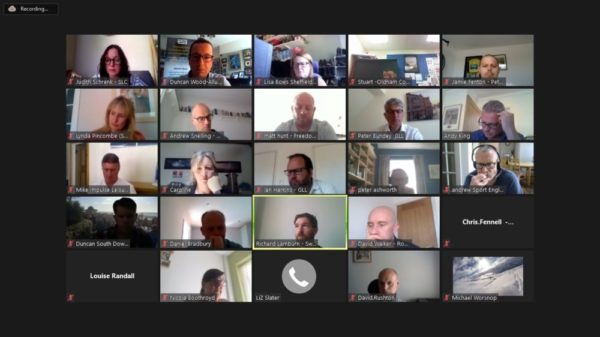On the 23 March 2020, central government introduced a nationwide ‘Lockdown’ to help prevent the spread of Covid-19. With leisure centres, swimming pools and other facilities closing their doors to the public, we asked ourselves how could we best support sector colleagues in responding to the Covid crisis?
Local authorities were facing an unprecedented challenge. It became apparent to us that senior leisure sector stakeholders needed a trusted platform to support each other, share knowledge and connect with others facing similar challenges – we made it our mission to create this platform through a series of Virtual Think Tanks.
 Over 100 local authorities and 10 leisure operators from across the country attended our Virtual Think Tanks from 2 April onwards. Over the past five months, SLC hosted 12 sessions exploring key questions and Covid related challenges. Topics included: the immediate challenges faced by both leisure trust and leisure operator partnerships in Lockdown, contractual and financial considerations in the face of the crisis and planning the recovery of local government leisure services. We also invested time in exploring the future of leisure provision post-Covid-19.
Over 100 local authorities and 10 leisure operators from across the country attended our Virtual Think Tanks from 2 April onwards. Over the past five months, SLC hosted 12 sessions exploring key questions and Covid related challenges. Topics included: the immediate challenges faced by both leisure trust and leisure operator partnerships in Lockdown, contractual and financial considerations in the face of the crisis and planning the recovery of local government leisure services. We also invested time in exploring the future of leisure provision post-Covid-19.
Facilitation of the sessions was provided by SLC’s Duncan-Wood Allum, Toby Kingsbury and David Rushton. The Think Tanks were supported by guest speakers, such as Steven Ward of GoFit, sharing his valuable insight and experiences of reopening facilities in Spain and Portugal with delegates. Ian Greenshields, partner at Womble Bond Dickinson provided support to delegates on the legal considerations faced during the recovery period and beyond. Peter Bundey of GLL and Richard Lamburn of Swim England shared their respective organisations’ approaches guidelines on planning recovery. Martyn Allison often provided useful support and challenge in many sessions.
 In our session on 23 July, Utku Toprakseven of 4Global, Caroline Constantine of Right Directions and Jamie Wilson of Tillr introduced tools to support a successful reopening of facilities and recovery of the sector.
In our session on 23 July, Utku Toprakseven of 4Global, Caroline Constantine of Right Directions and Jamie Wilson of Tillr introduced tools to support a successful reopening of facilities and recovery of the sector.
SLC’s Virtual Think Tanks not only provided a platform for guest speakers to share valuable insight and support, but at their core, they helped sector colleagues in local government and operators exchange knowledge and provide peer to peer support.
Facing the unprecedented challenges of Covid-19, the closure and subsequent safe reopening of some facilities, the sector had to come together and has been sharing learning more than ever before. Hosting and facilitating the Virtual Think Tanks has helped SLC shape its approach in supporting clients through the crisis and in coming out of it positively with their partners. We have supported 20 local authorities and a number of core cities on their approach to lockdown and recovery – the majority having now successfully reopened a number of their facilities to the public.
Our Recovery Planning Support was further strengthened through collaboration with leisure insight experts and developers of the DataHub 4global. Together, SLC and 4Global have developed a Local Authority Benchmarking Tool to support local authority clients and their leisure operating partners through the phases of recovery. The feedback from delegates in our sessions on 6 August has helped us refine the tool further.
We would like to express our gratitude to all the delegates and contributors over the last five months – we thank everyone for investing their time and providing insight and suggestions on how our sector can work together through these difficult times.
Duncan Wood-Allum, Managing Director of SLC said,
“I’m immensely proud of the impact that the SLC Virtual Think Tanks have had in supporting sector colleagues and developing thinking and ideas – particularly in those first two months of Lockdown which may have been the darkest days ever faced by the sector. Alongside supporting our clients through our consultancy work, we felt a compelling need to try to do something useful. Given there was very limited guidance and knowledge transfer being delivered, we stepped up and our delegates co-produced a body of work which we can all be very satisfied with. We all know the really hard work is yet to come but the networks and connections made will be extremely useful to colleagues in the coming months.”

